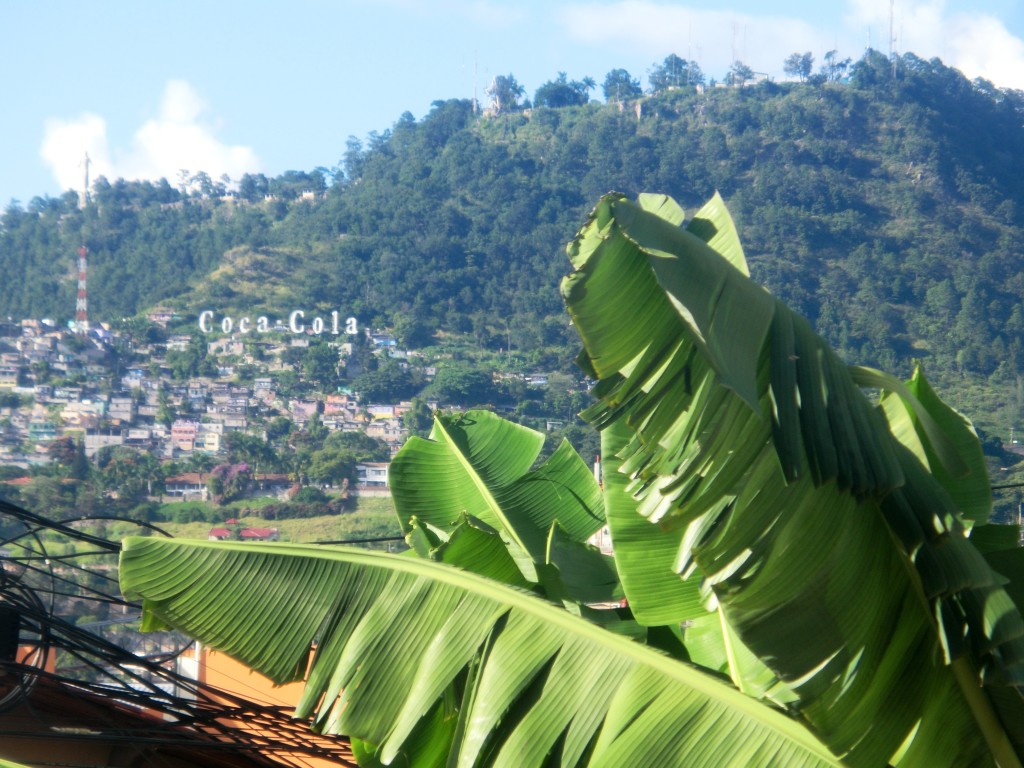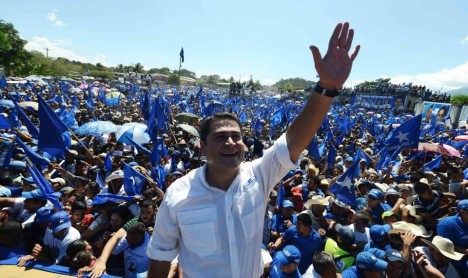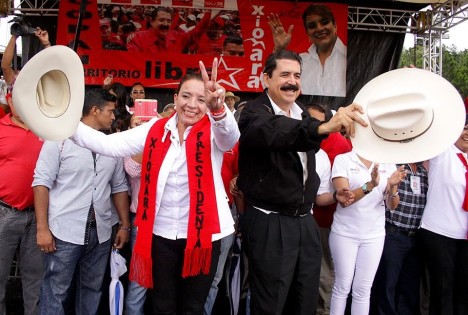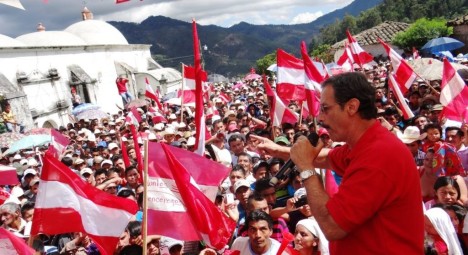TEGUCIGALPA — I’ve spent some time examining why the upcoming Honduran election is so important to Central American politics regionally and, above all, to US foreign policy as it relates to Central America and Latin America.![]()
But that’s not a thoroughgoing look at the actual election campaign itself — and what to expect on November 24, when Honduras will elect not only a new president, but all 128 members of its unicameral Congreso Nacional (National Congress).
Once upon a time, you could explain Honduran politics as a two-party contest, and above all as a set of dueling elites — the conservative Partido Nacional (PN, National Party) and the more centrist Partido Liberal (PL, Liberal Party). Though both parties were founded in the early 20th century, they essentially follow from the familiar 19th century narrative of an aristocratic conservative elite matched against a more free-market liberal elite. Both parties share in common an affinity for granting economic concessions to foreign interests throughout the 20th century, most notoriously to US-based banana companies (hence O. Henry’s christening Honduras as the original ‘banana republic,’ to state a cliché), and an even greater affinity for corruption.
Historically, the National Party really came into stride with the dictatorship of Tiburcio Carías Andino, who governed the country from 1932 to 1949 and Oswaldo López Arellano, who came to power via military force from 1963 to 1975 (with a brief interruption from 1971-72). Honduras made a firm turn toward democratic elections in 1981 and, since that time, with the exception of the June 2009 that ousted Manuel Zelaya from power, Honduras has generally selected its leaders through elections, however imperfect. The Liberal Party has elected five presidents, including Zelaya, and the National Party has elected three presidents, including the incumbent, Porfirio Lobo Sosa, who won an overwhelming victory of 56.6% against just 38.1% for Liberal candidate Elvin Santos in the most recent November 2009 election. Those elections were held during the interim administration of Liberal caretaker president Roberto Micheletti, who uneasily served as de facto president between the June 2009 coup and January 2010. Critics argue that they were conducted in an atmosphere of oppression, though, and many Latin American countries refused to recognize the result.
As the Honduran constitution limits the president to a single four-year term, Lobo Sosa is not eligible for reelection.
Four years later, on the eve of the 2013 presidential election, the country remains as polarized as in the immediate aftermath of the coup. But the advent of two new political parties has transformed the Honduran political scene, destabilizing its previously cozy two-party system. And with Honduras’s ignominious rise as the country with the world’s highest homicide rate (just over 90 per 100,000 according to UN figures for 2011), the campaign’s chief issue is security — how to reduce crime and violence that results not only from drug trafficking, but also from the police, who themselves are corrupted by drug traffickers.
The president of Honduras’s National Congress, Juan Orlando Hernández, is the candidate of the National Party, and Mauricio Villeda Bermúdez, an attorney with relatively little experience, is the candidate of the Liberal Party.
But the Frente Nacional de Resistencia Popular (FNRP, National Popular Resistance Front), which emerged in the aftermath of the Zelaya coup in protest, formed its own new political party in 2011 — the Partido Libertad y Refundación (LIBRE, Party of Liberty and Refoundation), a left-wing assembly of socialists, social democrats, indigenous and Afro-Honduran activists, human rights activists and women’s and LGBT activists. It selected as its candidate for the presidential election the spouse of the former president, Xiomara Castro de Zelaya, and her and her husband have long since left the Liberal Party. Moreover, sports reporter Salva Nasralla formed the center-right Partido Anticorrupción (Anti-Corruption Party), another populist right-wing party.
That’s made for a four-way race throughout much of 2013, though polls generally show a tightening of the race — Nasralla’s support has collapsed since the summer, and Villeda has stalled in third place, leaving Castro de Zelaya and Hernández in a close two-way race. Dueling polls show either Castro de Zelaya or Hernández in the lead, but the final poll from CID-Gallup (new polls are forbidden in the final month before the election), taken between October 9 and 15, shows Hernández with 28%, Castro de Zelaya with 27%, Villeda with 17%, Nasralla with 9%, others with 6% and fully 16% undecided or for none of the candidates — it should be noted that CID-Gallup has demonstrated a National Party bias in the past.
Though polling data should guide us, and it seems clear today that it’s a two-way race, it’s not necessarily clear that it will not be a three-way race by the time Hondurans vote later this month — especially in light of the Liberal Party’s traditional voter strength and ability to raise money, and especially because Villeda could emerge as a capable third, moderate force between the two extremes of the National Party and LIBRE candidates.
Moreover, the four-way party vote means that no party is likely to secure an absolute majority in the Congress. Since 1981, Hondurans have avoided splitting their tickets — so every time Hondurans have elected a Liberal president, they’ve elected a Liberal majority to the Congress (and the same with the National Party). This time around, though, it will be more difficult. In a relatively complicated system of multi-member districts, voters in each of the country’s 18 departments elect each of their representatives directly. So in Francisco Morazán, the populous department that includes and surrounds the capital Tegucigalpa, voters will have 23 votes to select from over 200 candidates. (If they miscount and elect more than 23, all of their votes will be voided; if they elect less than 23, corrupt officials haven’t been shy in the past about filling in their own preferences).
That system has virtually guaranteed that a handful of smaller parties have always received a few seats in the National Congress. This year, it means that each of the Liberal Party, the National Party and LIBRE will win many seats, likely enough to prevent any of the three parties from amassing a majority. That means the next president will have to form — or buy — a multiparty alliance.
Here’s a brief look at each of the three major candidates, their backgrounds and their agendas for Honduras.
Juan Orlando Hernández
Hernández, age 45, controls the National Congress with a firm hand, and he’s made every indication that he hopes to govern Honduras with a similarly firm hand. The 15th of 17th siblings, Hernández, or simply ‘JOH’ or ‘Juan Orlando,’ was born in Lempira, in the far west of Honduras. First elected to the National Congress in 1997, and appointed as president of the Congress in 2010, Hernández (pictured above) has not only become the legislative enforcer of the Lobo Sosa administration — he’s increasingly driven the national agenda from his perch in the legislative branch.
He’s pushed through an unpopular ‘security fee,’ which will be used to fund a controversial (critics say unconstitutional) new military police force. He also pushed through the legislation establishing the ‘charter city’ proposal championed originally by New York University economist Paul Romer. Though Romer’s no longer involved with the project, and the Honduran constitutional court ruled the legislation improper under the constitution, Hernández would like to push forward with revised legislation, though there are indications that the ‘Juan Orlando’ version of a Honduran model city will be less like Romer’s transparent, good-government ideal and more like a free zone to attract foreign development. From the National Congress, Hernández deposed (also illegally, critics say) four members of the constitutional court and a fifth member, Óscar Chinchilla, was named attorney general over the summer.
During the December 2012 primaries to determine the National Party’s presidential candidate, he only narrowly edged out Ricardo Álvarez, Tegucigalpa’s mayor since 2006. Álvarez and his supporters alleged voter fraud, though Hernández pushed forward against howls for a ballot recount and muscled his way to the nomination — and he joined forces with Álvarez earlier this year, who will serve as one of Hernández’s presidential ‘designates. Each candidate generally appoints a couple of designates — think of this as the Honduran variant of the vice presidency, but without all of the worthless formal duties involved. But the entire incident raised the fears of opposition groups that Hernández has a relatively lax attitude toward election fraud.
Hernández has promised during his campaign to put a ‘soldier on every corner,’ in line with his championing of the new Policia Militár (military police), a prospect that’s caused some amount of alarm. Given the human rights abuses of military police in the past, including the well-documented death squads in the 1980s, many Hondurans worry that the militarization of Honduras may be even worse than the ongoing violence — that’s especially true given the breakdown in the rule of law since 2009, when many opponents of the coup were arrested, beaten or even killed. Over the past four years, dozens of other activists, from labor organizers to members of indigenous communities to LGBT activists, have faced the same fate.
Moreover, Hernández’s exhortation that he’ll do ‘whatever it takes’ to win the election hasn’t allayed fears, given that Hernández and the National Party may well exert control over the national election commission. While international observers and observers from each party will watch the voting, there’s still room for significant fraud, and Hernández’s critics worry that he’ll resort to fraud, given that victory is not assured for the National Party.
Xiomara Castro de Zelaya
Castro de Zelaya (or simply ‘Xiomara’), age 54, is running on the opposite side of the spectrum as Hernández — a candidate who will push for a more social democratic government in Honduras.
Born in the Honduran capital of Tegucigalpa, she married Manuel ‘Mel’ Zelaya at the age of 17 and thereafter moved to his home in the Olancho department, to the northeast of Tegucigalpa. After serving as Honduras’s first lady for nearly four years, she came into her own politically after leading a high-profile rally protesting her husband’s ouster in early July 2009 while her husband was still trying to return to the country.
Her campaign has promoted raising the minimum wage, eschewing the military police for a more community-based policing approach, and government credit support for small farmers and small businesses. She has also vowed to revisit the constitutional revisions that her husband sought to introduce in a July 2009 referendum, though not the attempt to introduce the possibility of reelection for Honduran presidents.
Even if she doesn’t win, Xiomara’s candidacy will be historic because it’s smashed open the two-party duopoly in Honduras. Even if Xiomara (pictured above with her husband at a recent campaign event) loses the campaign, no one thinks that LIBRE is going anywhere. Its emergence is larger than either of the Zelayas in that it constitutes a truly progressive party for the first time in Honduran politics — it’s the first genuinely leftist party with widespread appeal in Honduran political history.
If Xiomara wins, her critics say that she’ll be a mere puppet presidenta, while her husband Mel calls the shots — and in a best-case scenario, it’s not difficult to imagine that Mel, who is running for Congress as a LIBRE candidate, will be an influence behind the scenes, much like Néstor Kirchner was an influence in the administration of his wife, Cristina Fernández de Kirchner.
Her critics accuse her of a wielding a socialist agenda, though there’s already uneasy tension between the relatively moderate rhetoric of her campaign and the more strident rhetoric of many LIBRE activists who support her — the real problem may be that a Xiomara-led administration won’t go far enough to satisfy LIBRE’s rank-and-file voters. That hasn’t stopped her most rabid opponents, who predict that Xiomara would immediately turn back to Venezuela, Bolivia, Ecuador and other leftist Latin American allies, and who whisper that a Zelaya restoration would meet the same end as the first Zelaya administration — a forced removal, this time by a militarized ‘deep state’ that’s had four more years to sharpen its grasp on Honduran government.
Perhaps her greatest challenge is the fatigue of moderate Honduran voters who simply want to turn the page on the Zelayas — they want neither another constitutional upheaval nor another destabilizing coup to remove an elected president from office.
Mauricio Villeda Bermúdez
Though he’s relatively new to national politics, Villeda comes from a strong political pedigree — his father Ramón Villeda Morales served as Honduras’s president from 1957 to 1963, championing a social democratic agenda to modernize the Honduran state. Friendly to the labor movement but still a fervent ally of the United States, Villeda Morales introduced elements of a welfare state to Honduras, and enacted agrarian reform, social security benefits, new spending for public health and education and a new labor code. A military coup ultimately toppled him in 1963 when he lost the support of the armed forces.
But Villeda Bermúdez has, unfortunately, none of his father’s charisma, and his father’s presidency is half a century old, too distant for most voters to remember, fondly or otherwise. Nonetheless, Villeda (pictured above) has a reputation as a serious, cautious and thoughtful attorney. A Roman Catholic and a member of Opus Dei, he’s also relatively conservative. Given that most of the left wing of the Liberal Party long ago decamped in favor of LIBRE, Villeda, unsurprisingly, comes from the more conservative wing of the Liberal Party. He rose to prominence as a stalking-horse candidate for Elvin Santos, the ultimate presidential nominee of the Liberal Party in 2008 (for electoral law purposes, Villeda stood for the nomination instead of Santos, and Villeda ultimately stood down on behalf of Santos).
Lagging in the polls and lagging in imagination, Villeda leads the remnants of a party divided by the Zelayas.
Nonetheless, the Liberal Party remains one of two legacy parties in Honduras, and Villeda could still emerge with enough support in a split three-way contest to eke out a victory (the winning candidate need only take a plurality, not an absolute majority). With many voters averse to either the leftist Xiomara or the conservative Hernández, Villeda’s gray personality could well become an appealing attribute to undecided Hondurans.



